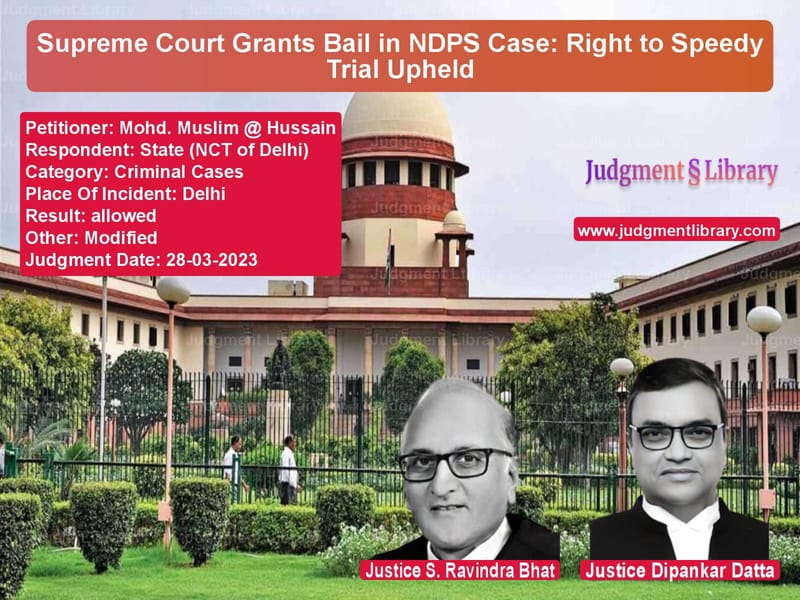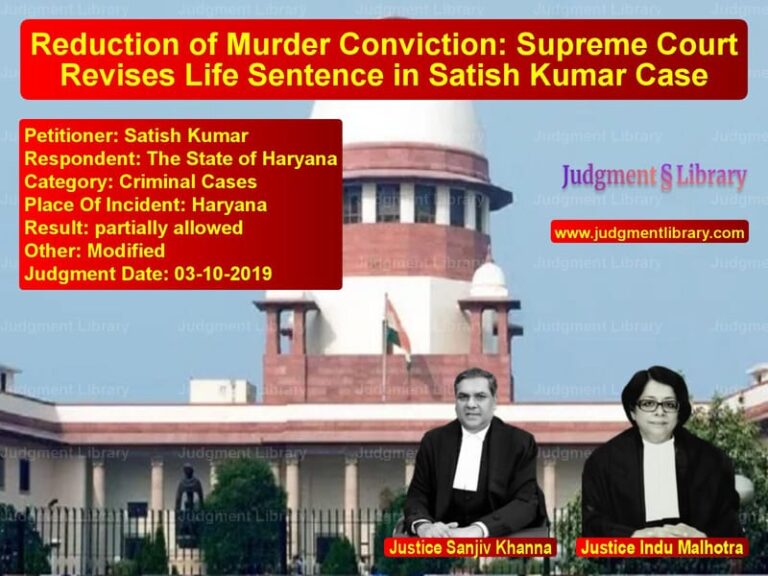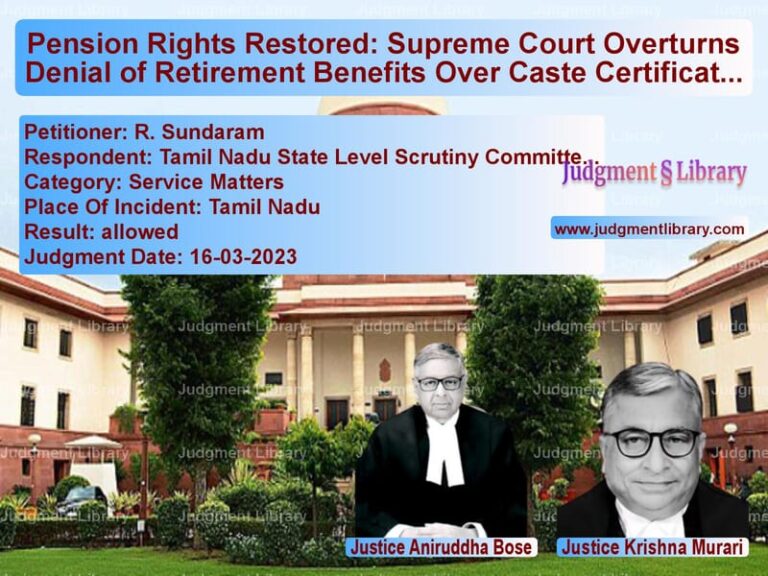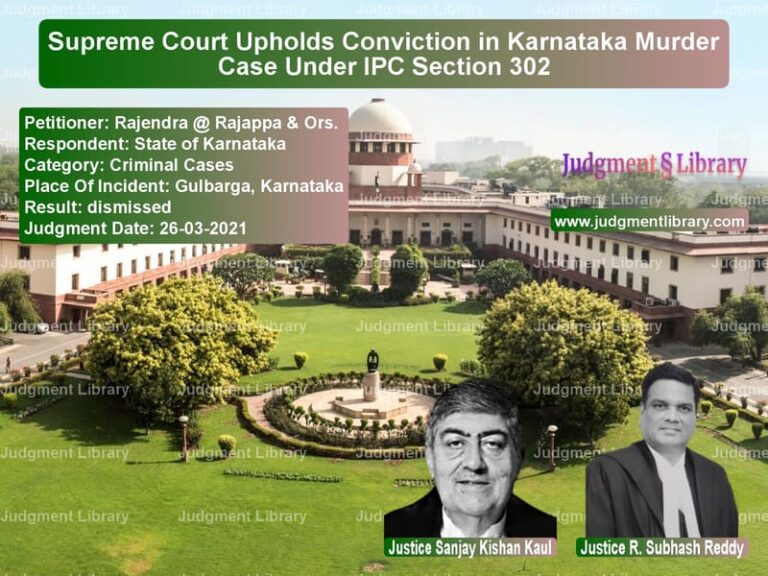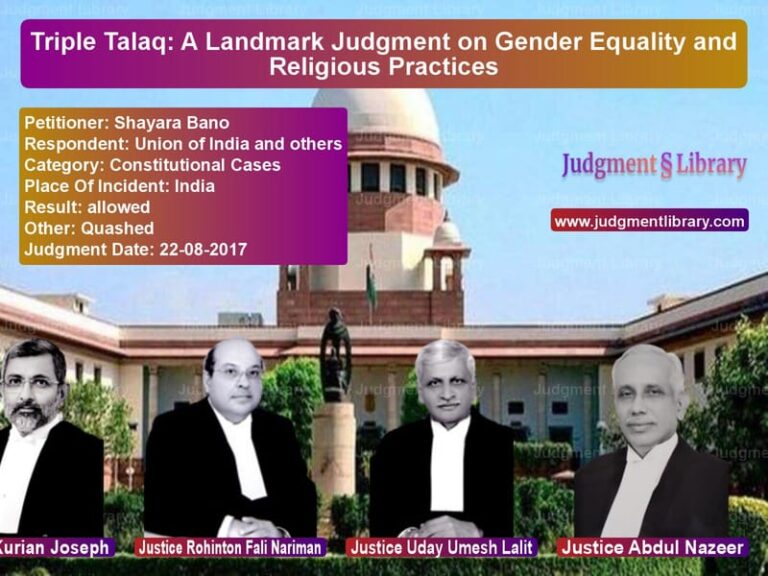Supreme Court Grants Bail in NDPS Case: Right to Speedy Trial Upheld
The case of Mohd. Muslim @ Hussain vs. State (NCT of Delhi) revolves around the prolonged incarceration of an accused under the Narcotic Drugs and Psychotropic Substances Act, 1985 (NDPS Act). The Supreme Court, while granting bail, reaffirmed the fundamental right to a speedy trial, emphasizing that prolonged detention without trial is a violation of Article 21 of the Constitution.
Background of the Case
The case concerns the arrest of Mohd. Muslim, who was accused of participating in a drug trafficking operation. The prosecution alleged that he was involved in the supply and distribution of 180 kilograms of ganja, a banned narcotic substance.
Key events leading to the dispute:
- September 28, 2015: A raid was conducted, leading to the arrest of four accused individuals in possession of 180 kilograms of ganja.
- October 3-4, 2015: The present appellant, Mohd. Muslim, was arrested based on the statements of the arrested co-accused.
- February 29, 2016: The charge sheet was filed under Sections 20, 25, and 29 of the NDPS Act.
- July 5, 2016: Charges were framed.
- 2016-2017: Two supplementary charge sheets were filed.
- June 8, 2022: Bail was rejected by the trial court.
- September 8, 2022: The Delhi High Court rejected the bail plea.
- March 28, 2023: The Supreme Court granted bail.
Issues Raised in the Case
The case primarily revolved around the following legal questions:
1. Does Prolonged Incarceration Violate the Right to a Speedy Trial?
The petitioner contended that having spent over seven years in custody, his continued detention without conclusion of trial violated his fundamental rights.
2. Was the Bail Application Justified Despite the Stringent Conditions Under Section 37 of the NDPS Act?
The prosecution opposed bail under Section 37 of the NDPS Act, which imposes strict conditions for granting bail in drug-related offenses.
Arguments by the Petitioner (Mohd. Muslim)
The petitioner’s counsel, Ms. Tanya Agarwal, argued the following:
- The petitioner had been incarcerated for over seven years, with no sign of trial concluding soon.
- Out of 64 witnesses, only 30 had been examined, indicating that the trial would take several more years.
- The main accused, Virender Singh @ Beerey, had already been granted bail.
- There was no direct recovery of contraband from the petitioner.
- The delay in trial violated the right to a speedy trial under Article 21.
Arguments by the Respondent (State of NCT of Delhi)
The prosecution, represented by Additional Solicitor General Vikramjit Banerjee, opposed the bail, arguing that:
- The petitioner was actively involved in drug trafficking.
- Bank transactions linked the petitioner to the crime.
- The NDPS Act contains stringent bail conditions, preventing the release of accused individuals unless they prove that they are not guilty and will not commit any offense while on bail.
- The trial delay was not intentional and was due to procedural requirements.
Supreme Court’s Judgment
The Supreme Court ruled in favor of the petitioner and granted bail, making the following key observations:
1. Right to Speedy Trial is a Fundamental Right
The Court cited Hussainara Khatoon vs. State of Bihar and reiterated that prolonged incarceration without trial is unconstitutional.
“Speedy trial is an integral and essential part of the fundamental right to life and liberty enshrined in Article 21.”
2. Prolonged Detention Without Conviction is Unjust
The Court expressed concern over excessive delays:
“Laws which impose stringent conditions for grant of bail may be necessary in public interest; yet, if trials are not concluded in time, the injustice wrecked on the individual is immeasurable.”
3. Bail is Justified When Trials are Unduly Delayed
The Court ruled that the rigors of Section 37 of the NDPS Act do not prevent courts from granting bail in cases of prolonged incarceration.
“When the undertrial period exceeds half the maximum sentence prescribed, continued detention is unjustified.”
4. Special Conditions Under NDPS Act Do Not Override Fundamental Rights
The Court referred to Union of India vs. K.A. Najeeb, emphasizing that statutory bail restrictions must be read in light of constitutional rights.
“Statutory restrictions on bail cannot fetter a constitutional court’s ability to grant relief when there is a clear violation of fundamental rights.”
Final Ruling
The Supreme Court:
- Allowed the appeal and granted bail.
- Directed the trial court to impose suitable conditions.
- Reaffirmed the need for expediting trials, especially under special laws like the NDPS Act.
Implications of the Judgment
This ruling has significant implications for bail jurisprudence:
1. Strengthening the Right to Speedy Trial
- Ensures that undertrials are not indefinitely detained.
- Encourages courts to expedite proceedings in special law cases.
2. Clarifying Bail Provisions Under the NDPS Act
- Establishes that prolonged incarceration can be a valid ground for bail.
- Ensures that Section 37 of the NDPS Act does not override constitutional protections.
3. Setting a Precedent for Future Bail Cases
- Provides clarity on balancing societal interests and individual rights.
- Ensures fairness in the criminal justice system.
Conclusion
The Supreme Court’s ruling in Mohd. Muslim vs. State (NCT of Delhi) underscores the need for a balanced approach to bail. While stringent laws are necessary for serious crimes, prolonged incarceration without trial cannot be justified. The judgment reinforces the importance of the right to a speedy trial and ensures that justice is not delayed or denied.
Petitioner Name: Mohd. Muslim @ Hussain.Respondent Name: State (NCT of Delhi).Judgment By: Justice S. Ravindra Bhat, Justice Dipankar Datta.Place Of Incident: Delhi.Judgment Date: 28-03-2023.
Don’t miss out on the full details! Download the complete judgment in PDF format below and gain valuable insights instantly!
Download Judgment: mohd.-muslim-@-hussa-vs-state-(nct-of-delhi)-supreme-court-of-india-judgment-dated-28-03-2023.pdf
Directly Download Judgment: Directly download this Judgment
See all petitions in Bail and Anticipatory Bail
See all petitions in Drug Possession Cases
See all petitions in Custodial Deaths and Police Misconduct
See all petitions in SC/ST Act Case
See all petitions in Judgment by S Ravindra Bhat
See all petitions in Judgment by Dipankar Datta
See all petitions in allowed
See all petitions in Modified
See all petitions in supreme court of India judgments March 2023
See all petitions in 2023 judgments
See all posts in Criminal Cases Category
See all allowed petitions in Criminal Cases Category
See all Dismissed petitions in Criminal Cases Category
See all partially allowed petitions in Criminal Cases Category

